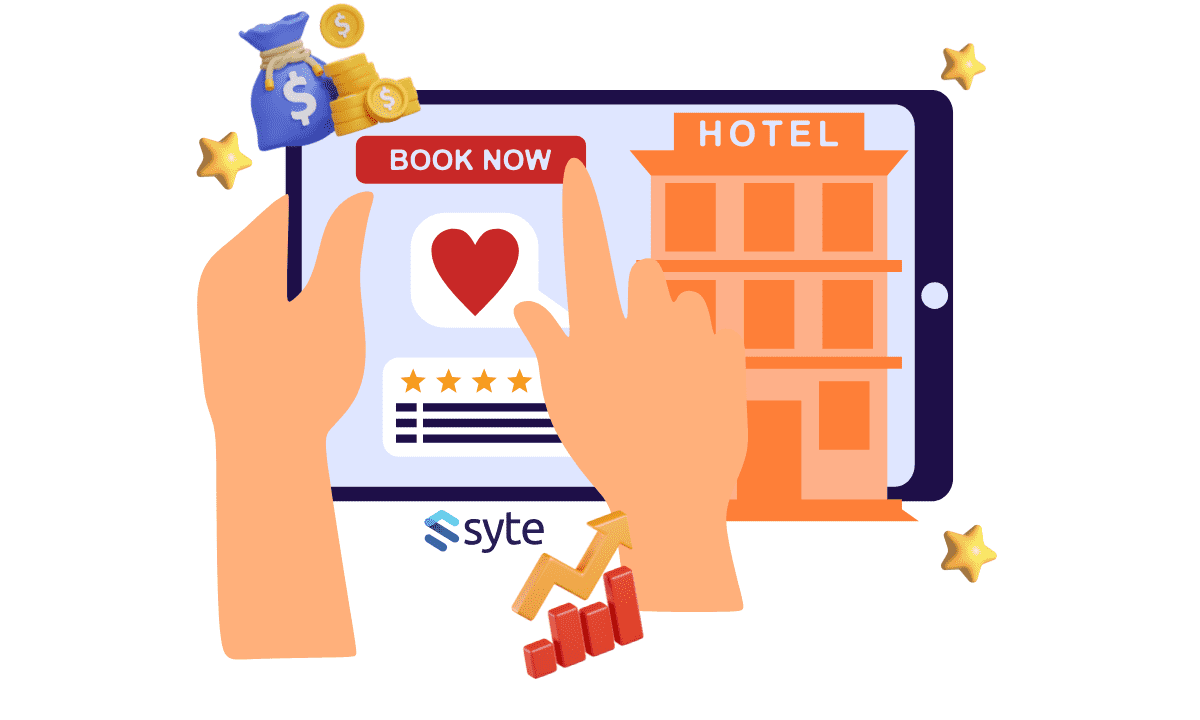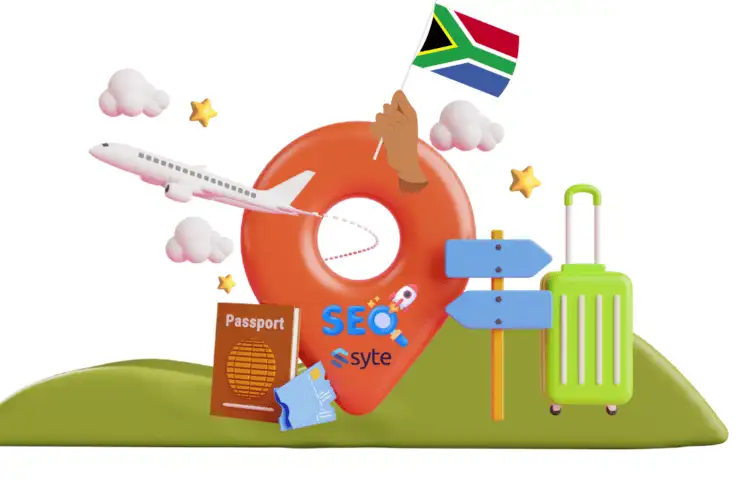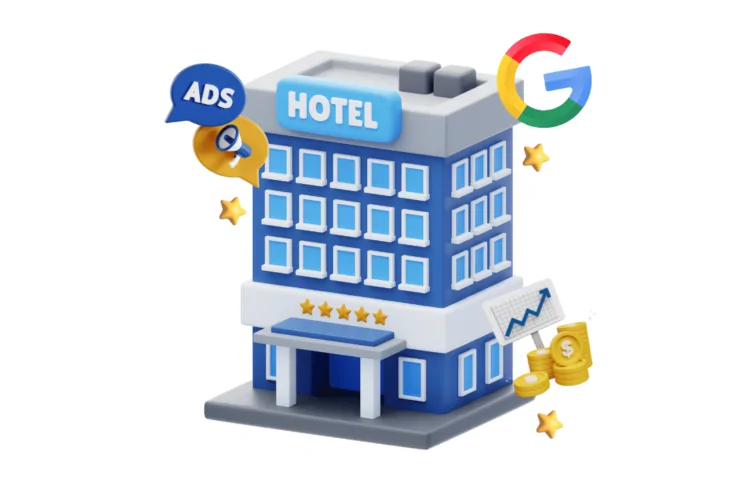Buckle up hotel owners and marketers, because 2024 is your year to thrive online. Let’s dive into a whole universe of untapped potential: your hotel’s website. A slick, easy-to-use design, savvy SEO usage, and captivating content marketing can drive a wave of bookings straight from your website. Intrigued? Stick around as we tackle ways to transform your hotel’s online presence and reel in those direct bookings like a seasoned fishing expert. Now, let’s catch some bookings!
How Can Hotel Website Design Increase Direct Bookings?
Picture yourself as a possible guest looking for their perfect vacation stay. Likely, your journey starts on the hotel’s website, defining your first impression of the hotel. An intuitively designed, clean, and appealing website is critical to not just make a positive impression but also to drive direct bookings.
Your hotel website design serves as the digital storefront that can either turn your visitors into clientele or make them switch tabs to another hotel. Thus, here’s why it’s crucial to have a clean, intuitive website design.
Firstly, a well-formed website design guides users like a well-lit path. It navigates them naturally to key action points: booking rooms, checking out dining options, or exploring your spa services. This kind of navigation is standard in hotel marketing (Hotel marketing). With minimal distraction, your potential guests can find what they are looking for quickly and effortlessly, thus driving more direct bookings.
Next, the importance of clear, prominent Call To Actions (CTAs) in this process can’t be underestimated. CTAs like ‘Reserve Now,’ ‘Book Your Stay’, etc., are crucial stepping stones in your conversion path. They serve as the ultimate checkpoints that visitors need to cross to transform into guests.
Just as it’s crucial to get your CTAs right, it’s equally important to ensure that your website has a mobile-responsive design. With more people now browsing the internet on their smartphones, a hotel site that isn’t optimised for mobile viewing could lose potential guests faster than a leaky bucket losing water.
Now, as crucial as the website’s outlook is, the real hero behind driving direct bookings is a reliable booking engine. It enhances the user experience by providing quick, hassle-free booking processes.
Lastly, in your attempt to create a visually pleasing website, don’t overlook the importance of streamlining navigation. The key is to make it easy for visitors to find what they’re looking for. A well-thought-out and simple navigation menu not only enhances the user experience but also significantly improves the chances of a visitor making a reservation.
Sticking to these principles can significantly amplify your conversion rates, translating into flourishing business growth. Remember, your hotel website is the heart of your online presence. To quote Rumi, “The beauty you see in me is a reflection of you.” So ensure to make your hotel’s website a beautiful reflection of the stay you offer.
How Can Hotel Website Design Increase Direct Bookings?
Looking at the hotel industry, it’s becoming increasingly clear that the design of your website plays an enormous role in attracting and securing bookings. An intuitive, user-friendly design immediately makes a lasting impression on potential customers. If visitors can quickly and easily find what they’re searching for, they’re more likely to book a room. So, how does a clean, intuitive design become a contributing factor to increasing direct bookings?
It’s all down to user experience. Imagine yourself as a potential guest. If you’re greeted with a cluttered site, filled with overwhelming information, you are likely to abandon the site. Now, consider a clean, well-organised website displaying the key points right off the bat, whilst supporting photos entice you to explore further. Which one would you consider booking a room with?
Prominent call-to-action (CTA) buttons play an essential role in securing reservations. With the right positioning, size, and shade, CTAs such as “Book Now” or “Check Availability” can effectively guide visitors to make a reservation.
Today, mobile traffic is dominating the internet, meaning a mobile-responsive design is no longer an option. A site that’s difficult to navigate on a smartphone will likely lose out on a significant number of bookings, given that more than half of all online bookings stem from mobile devices.
A reliable booking engine enhances the user experience by ensuring a seamless, painless booking process. It needs to be intuitive, secure, and quick. Guests shouldn’t have to jump through unnecessary hoops to finalise their booking.
Lastly, streamlining site navigation improves user experience by allowing visitors to easily move through your site, finding the information they need without frustration. Essentially, you should structure your site in such a way that visitors can go from landing on the homepage to finalising a booking within just a few clicks.
If you’re looking for assistance in optimising your hotel website, consider seeking expertise from a hotel marketing agency. They can help you apply these principles effectively, fostering an increase in direct bookings. Remember, your website serves as the online face of your establishment. Make it inviting, engaging, and easy to navigate, and you’ll significantly improve your chances of filling those rooms.
How Can Hotel Website Design Increase Direct Bookings?
Your hotel’s website is an integral part of your digital marketing strategy. A well-designed website can significantly enhance your online representation, appeal to potential guests, and secure more direct bookings. With the advancing digital landscape, it’s crucial to understand exactly how web design can work for your advantage.
Firstly, the importance of a clean, intuitive design can’t be overstated. An attractive, easy-to-navigate website design not only provides an enjoyable online experience but also builds trust among prospective guests. Key information about rooms, amenities, location, and direct booking perks should be readily accessible.
Secondly, consider the role of CTAs (Call to Actions) – designed to guide visitors towards making a reservation. Strong CTAs should be strategically placed throughout your website. They must be clear, compelling and lead your potential guests towards a simple and secure online booking process.
Next, we delve into the benefits of mobile-responsive design. In a time where smartphones are quickly becoming the go-to device for internet browsing, having a mobile-optimised website isn’t an option—it’s a necessity. A website that displays effectively on diverse screen sizes will reach a wider audience, thus potentially increasing your direct bookings.
We also need to address how a reliable booking engine can enrich the user experience. It should be as seamless on mobile devices as it is on desktop computers. Features like real-time availability, secure payment gateway, and instant booking confirmation can make all the difference in converting website visitors into hotel guests.
Lastly, let’s discuss the approaches for streamlining navigation for improved user experience. Simplify menus, decrease page load times, and ensure easy access to your booking engine from any webpage. Consistency and simplicity in design will keep your visitors engaged and less likely to abandon their booking process.
Always remember, a positive user experience on your website can turn first-time guests into repeat customers. Creating a website that’s designed to convert is a smart business move. To help you achieve this, I highly recommend enrolling in expert hotel marketing services, like the one provided by Syte, to take your hotel’s online presence to the next level.
How Can Hotel Website Design Increase Direct Bookings?
Let’s kick things off by exploring the significance of a clean, intuitive design. The design of your hotel’s website forms the first impression and can be deciding factor between a visitor bouncing away or sticking around to learn more about your offerings. A clean, intuitive design that’s easy on the eyes makes it simple for visitors to navigate and complete their booking.
But having a beautifully designed website isn’t enough. CTAs, or call-to-actions, play a crucial part in boosting reservations. These interactive buttons act like signboards that show your visitors where to go next. Effective CTAs can dramatically increase conversions and help guide your visitors to complete a booking.
With 52.2% of worldwide online traffic in 2021 coming from mobile, it is impossible to overemphasise the benefits of a mobile-responsive design. A mobile-responsive layout resizes and rearranges content to fit any screen size, providing a smooth browsing experience on smartphones, tablets, and desktop computers alike.
And when it comes to the actual booking process, a reliable booking engine can enhance the user experience significantly. It simplifies the reservation process, enables simple and safe online transactions, and provides real-time availability and pricing, making the booking experience seamless for your guests.
Finally, for a truly user-centric design, consider streamlining your website’s navigation. Make it easy for visitors to find what they need with minimal clicks. For more tips on how to do this, check out our post on Hotel marketing.
By focussing on these areas, you can design a website that drives more direct bookings for your hotel in 2024. Now let’s delve into the next crucial piece of the puzzle: Search Engine Optimisation or SEO.
How Can Hotel Website Design Increase Direct Bookings?
An aesthetically pleasing website is more than just a visual representation of your hotel; it’s a gateway to customer conversions. One of the most critical aspects of your hotel’s online presence is a clean, intuitive design. The colours, fonts, and images should align to create a coherent, pleasing perspective that effortlessly tells your hotel’s story, encapsulating both its aesthetic and philosophy.
A crucial part of your website’s design is the Call to Action (CTA). These buttons guide your visitor to the next stage — be it viewing room options, exploring facilities, or reaching out to your customer service team. Highly visible, engaging CTAs are game-changers in the quest to boost reservations.
In today’s digital world, most internet users are on-the-go, obtaining information via their mobile devices. Hence, your website’s design needs to cater to handheld devices as much, if not more, than to a desktop. A mobile-responsive layout adapts to different screen sizes, enabling users to navigate your site with ease regardless of their device. It also improves your standing in Google’s mobile-first index, supplementing both user experience and SEO.
Equally important to boosting bookings is a functional, dependable booking engine, acting as the catalyst for your potential customer’s journey from a visitor to a guest. It should provide a seamless experience, from room selection to completion of payment, with no hiccups to deter a potential booking.
Improving navigation also significantly enhances the user journey on your website. With multiple elements to showcase, such as rooms, restaurants, additional services, and so forth, a well-structured navigation bar is vital for a user-centric experience. Check out this blog post on Hotel marketing for in-depth insights into streamlining navigation to make browsing and booking on your website a breeze.
In essence, your hotel’s website serves as the first impression for potential customers in many instances. Its design, therefore, holds substantial weight in acquiring direct bookings. Make it count!
Next section: What Role Does SEO Play in a Hotel’s Website Optimization?
What Role Does SEO Play in a Hotel’s Website Optimization?
Just as much as we strive to deliver exceptional service to our esteemed guests in person, it’s crucial we maintain the same standard online. In today’s increasingly competitive digital landscape, having a visually appealing website isn’t enough. This is where Search Engine Optimization (SEO) comes in to play a pivotal role.
SEO involves improving your website to increase its visibility when people search for products or services online. To gain prized positions in organic search results, let’s look at the process of identifying and incorporating relevant keywords. Keywords are the phrases that potential guests use to search for hotels in Google or other search engines. By understanding and implementing a list of targeted keywords, such as ‘luxury hotel in Cape Town’ or ‘budget-friendly accommodation in Durban’, you’re directly aligning your website to customer’s search queries and location preferences. Experiment with long-tail keywords (more specific phrases) for better targeting and lower competition.
Alongside the use of relevant keywords, the benefits of using proper heading tags extend beyond just aesthetics. Heading tags (H1-H6) structure your content to signal the information hierarchy to search engine algorithms. The H1 tag typically contains the overall theme of your page (should be unique for each page), while H2 and H3 tags indicate subheadings and related topical pointers, making the content easier to scan for both search engines and human readers.
SEO isn’t just global; it can be local too. Implementing local SEO strategies enhances search visibility around your hotel’s physical location. For instance, setting up a Google My Business listing complete with accurate contact details, high-quality photos, and reviews can significantly improve your chances of appearing in local search results. This is crucial given that ‘near me’ searches are becoming increasingly popular.
Speaking of Google My Business (GMB), it’s not sufficient to just have a listing; you need to make the most out of it. Here are some tips for optimizing Google My Business listings. For hotels, this involves regularly updating information, encouraging and responding to reviews, and leveraging GMB posts to promote special offers or news. Over time, a well-optimised GMB listing can serve as a powerful tool that directs potential guests to your website for direct bookings.
Whether you are trying to attract local visitors or international travellers, with the right strategies, SEO can be an efficient route to increase your online visibility, and consequently, your hotel’s direct bookings. Mastering these concepts will help set your website apart from the competition in 2024 and beyond. Remember – staying ahead in digital means staying open to continual learning, iteration, and improvement.
Why Are Analytics and Continuous Improvements Necessary for a Hotel Website?
Keeping an eye on your hotel website’s analytics and constantly searching for ways to improve is crucial in the ever-changing landscape of digital marketing. Consistently reviewing booking trends and website analytics give you opportunities to adjust your strategies to better meet your customer’s needs.
One classic example of a terrific tool for this is Google Analytics. It’s able to accurately track a plethora of statistics such as website traffic, bounce rates, the channels driving the traffic, and more. By consistently monitoring these statistics, you can identify potential weak spots in your website and make the necessary improvements.
When it comes to room rates, market demand and seasonality are significant factors to consider. It’s beneficial to continually fine-tune your room rates based on these factors to ensure you’re offering the best prices that will attract more bookings. And remember, people appreciate transparency, so always make sure the rates on your website are up-to-date and clearly stated.
Apart from Google Analytics, tools like heat maps and session recordings can provide more granular insights into your website’s performance. For instance, heat maps show you where users are clicking on your site, while session recordings allow you to visually review user interaction. These tools help you understand where the user journey may be breaking down, so you can improve the layout, navigation, and other aspects of your website for a smoother customer experience.
These steps are vital in creating a user-friendly website that guests enjoy using—one that successfully convinces them to book directly rather than through third-party websites. Finally, keep in mind that you’re continuously making these improvements to not only increase bookings but also to provide a great user experience that garners loyalty among your guests.
To dig deeper into analyzing and optimizing your digital marketing strategy, don’t forget to check out our blog.
How Can Hotel Website Design Increase Direct Bookings?
When it comes to attracting direct bookings to your hotel, every aspect of your website design counts. Effective website design isn’t just about aesthetics; it’s about creating a user-friendly platform that simplifies the booking process.
Firstly, the importance of a clean, intuitive design cannot be overstated. A cluttered or confusing layout may deter potential guests, causing them to seek accommodations elsewhere. With clean design, each page of your site serves a clear purpose, guiding users effortlessly to make a booking.
Alongside a straightforward design, effective call-to-action (CTA) prompts play a key role in boosting reservations. Sprinkled throughout your site, these CTAs should propel visitors toward booking a room, offering a seamless transition from browser to guest.
In the digital age, almost everyone uses a smartphone. As such, your hotel’s website must incorporate a mobile-responsive design. If your site isn’t mobile-friendly, you’ll miss out on a significant chunk of potential bookings.
Integrating a reliable booking engine significantly enhances user experience. It means guests can safely and securely book a room without leaving your site. Instead of redirecting users to third-party booking sites—where they might be tempted to browse other hotels—a booking engine keeps potential guests in your controlled reservation process.
Lastly, a well-streamlined navigation experience plays a pivotal role in securing direct bookings. Creating a smooth, efficient browsing journey through site optimisation reduces the likelihood of users deserting reservations or engagements midway. Our work in Hotel marketing is a testament to how effective navigation streamlining can be in improving guest experience and driving direct bookings.
In summary, every facet of your hotel’s website design—the layout, the CTAs, the booking engine, even the mobile responsiveness—all work to create a streamlined, user-friendly experience that encourages direct bookings. Be sure to problem-solve any navigation issues that might be slipping potential guests through cracks.
How Can Hotel Website Design Increase Direct Bookings?
A well-designed hotel website can work wonders for driving direct bookings. To that end, one cannot understate the importance of a clean, intuitive design. It’s not just about looking sleek and modern – your website’s design should lead your visitors down the booking funnel with as minimum friction as possible.
A well-planned layout, an easy-to-use booking engine, and clearly visible Call-To-Actions (CTAs) strategically placed can significantly increase your direct bookings. Remember, every little hassle the user faces on your website represents a possibility for them to abandon their booking and look elsewhere.
Mobile-responsive design is no longer just a “good-to-have” aspect of your website. It’s an absolute necessity. With the rise in mobile search traffic, having a website that doesn’t render well on mobile devices means you’re in grave danger of losing potential customers.
Here, the discussion about a reliable booking engine comes front and centre. It needs to be user-friendly, and importantly, it needs to function securely and efficiently no matter what platform the user is on. Incorporating real-time availability, personalising recommendations, and providing an array of payment options can enhance the user experience.
Consider this as you streamline your website navigation. Simplify it as much as possible. The easier it is for your guests to find what they’re looking for, the more likely they are to end up making a reservation.
Also, remember that it’s not just about getting your visitor to the booking engine – it’s also about guiding them through the entire process. Intuitive, easy-to-use controls that clearly communicate what the visitor should do next is the key to prevent people from dropping halfway through the process.
As you explore ways to improve the design of your hotel website and ultimately increase direct bookings, also consider checking out this comprehensive piece about Hotel marketing. It shares more in-depth insights and additional strategies you can implement to build a successful brand.
Partner with Syte for Unparalleled Hotel Web Design and Marketing Expertise
At Syte, we understand the intricacies of transforming your hotel website into a high-converting digital storefront. Our team excels in crafting websites that not only captivate visitors with clean, intuitive designs but also guide them effortlessly through the booking process. With our expertise in creating visually appealing and mobile-responsive sites, we ensure that your visitors have a seamless experience on any device—a crucial factor as mobile traffic continues to dominate the internet.
Utilizing strategically placed Call-To-Actions and integrating reliable, user-friendly booking engines, Syte ensures that potential guests remain engaged and motivated to secure their reservations with you, rather than with third-party platforms. We also specialize in streamlining site navigation to enhance user experience, boosting conversion rates while building lasting guest loyalty.
Are you ready to elevate your hotel’s digital presence and drive more direct bookings? Partner with Syte and let us guide you towards achieving your digital marketing goals with precision and flair. Reach out to us today through our contact page and begin your journey to creating a stunning, high-performing hotel website.



